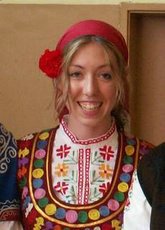I'm not finished with it yet, but I've found it while not spell binding, very interesting. I'm sorry if I offend any Bulgarian readers, but there are some distinct similarities between the culture she describes and the Bulgarian culture I have encountered. This part of Greece was also under Turkish rule and then run by the communists, like Bulgaria. What's more striking is the similarity of the process.
A woman goes far away, alone. She lives in a small town, alone. She learns about the culture, habits, and lifestyles. She becomes a part of the place. She completes her mission and return to life.
There are two small bits of the book that struck me deeply.
"To love a place
is to feel for it, to let it wound you so it leaves a scar, a permanent
keepsake."
"I didn't know when I'd be back, and I worried that the
people I know and loved would forget I had ever lived in Lia."
These days, years, tears, experiences have become so deeply apart of who I am and they will always be with me. They have shaped the frame of my soul and have redirected the path of my destiny. I must come to terms with the fact that if I come back to visit in two years time, life will have gone on for my friends. They have meant more to me than I have to them.
My dearest colleague and friend, Yulia, and I are going to be presenting some bits of each other's culture on our 24th of May celebration. The 24th of May is the day celebrating the saints Kiril and Metodi, the founders of the the Cyrilic alphabet. This is the biggest day in the world of Bulgarian education. I will be reciting a Bulgarian poem, "Аз съм Българче" or translated, "I am Bulgarian" but the diminutive form of the word Bulgarian, as if the speaker is a child. I should also prepare a bit of a speech in Bulgarian for the occasion. Where to start. I've started several times, in English and Bulgarian.
Не'м думи.

No comments:
Post a Comment